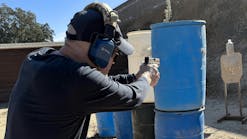As the bodies of her former law-enforcement colleagues pile up in Mexico’s violent drug wars, former small-town police chief Marisol Valles Garcia is fighting for asylum in the United States.
“I thought I could make a difference,” Valles says of her decision at age 20 to become the top cop in Praxedis Guadalupe Guerrero, a dusty town of 9,000 in the Chihuahua region, just south of the US border.
Two of her predecessors were executed, and the job was vacant for a year before Valles, a criminal-justice student, took it.
But she, too, was vulnerable to the intense violence of the drug wars, and two years ago decided to flee to Texas, where she now works 12-hour shifts at a pecan-processing factory to support her toddler and five relatives.
Her first immigration hearing is scheduled for next summer. Still, she told The Post, “We are grateful to be alive, to have security.”
Valles, now 22, made worldwide headlines in 2010 when she bravely took over as Praxedis police chief.
“We can’t let fear beat us,” she announced.
Taking the post was a brave move. Several members of her department had been murdered, and her immediate predecessor was chief for just a week before his severed head was delivered to the police station in a cooler.
It was clear the job of top cop was likely a death sentence, but Valles was undaunted.
She hoped to make her mark in the 13-officer department by focusing on domestic violence and juvenile crime. She figured it was the job of Mexico’s army to take on the rival Sinaloa and Juarez cartels battling for control of drug routes to the United States.
“I felt that people were beginning to trust the police again,” Valles said of the time she spent in the high-profile job.
But the drug lords put her in their sights after she refused to tip them off about police and military maneuvers.
Soon after, she got a chilling message on her cellphone from an unknown number: “Didn’t you receive the message?” the mysterious male voice told her. “We don’t want you here.”
Within a half-hour, her family had packed and fled to the US border in a neighbor’s pickup truck.
Today, her future is uncertain — a far cry from the days not long ago when Valles was an idealistic student.
Her husband, who was a diesel mechanic in Mexico, has worked a series of odd job in the United States, including as a ranch laborer and at a cement factory.
Valles refuses to disclose where she is living, or to identify any family members by name.
She had little to say about the recent murder of small-town mayor Maria Santos Gorrostieta, 36, an outspoken critic of the cartels who had survived two previous assassination attempts.
Last month, Santos’ half-nude and mutilated remains were found by a roadside.
Republished with permission of The New York Post


